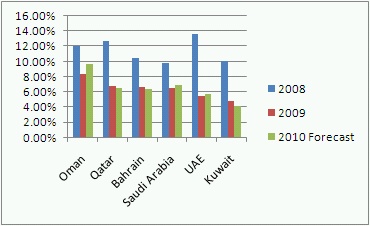 The recent economic crisis and the Dubai debt has effected the economies worldwide, drastically. However the GCC countries still stand out much less effected than the rest of the world in terms of Job and pay raises.
The recent economic crisis and the Dubai debt has effected the economies worldwide, drastically. However the GCC countries still stand out much less effected than the rest of the world in terms of Job and pay raises.
Amoung the GCC countries The UAE and Kuwait have seen most job cuts and largest drops in pay rises. Real estate sector is the most affected, while audit professionals received the largest pay increases this year in the Gulf.
Professionals working in the Gulf region have been hit hard by the downturn, with almost two-thirds not receiving any pay increase and one in ten losing their jobs this year, according to research conducted by GulfTalent.com
Based on findings of the study, average salary increases across the six Gulf countries over the 12-month period to August 2009 fell sharply to 6.2% compared with 11.4% over the same period last year.
 Gulf Country Average Pay Raises by Country
Gulf Country Average Pay Raises by Country
| Country | 2008 | 2009 | 2010 Forecast |
| Oman | 12.1% | 8.4% | 9.7% |
| Qatar | 12.7% | 6.8% | 6.6% |
| Bahrain | 10.5% | 6.7% | 6.4% |
| Saudi Arabia | 9.8% | 6.5% | 7% |
| UAE | 13.6% | 5.5% | 5.8% |
| Kuwait | 10.1 | 4.8% | 4.2% |
The drop was most severe in the UAE, which fell from 13.6% to just 5.5% this year, largely due to its heavy exposure to the real estate sector. Kuwait also saw a significant drop in pay rises from 10.1% to 4.8%, after the value of its financial investments collapsed.
Pay rises in Saudi Arabia stood at 6.5%, compared with 9.8% last year, the smallest fall among GCC countries. Massive spending by the Saudi government on infrastructure projects this year has helped maintain economic activity.
In terms of job categories, audit professionals received the largest pay rises at 7.5%, as demand for their services surged following the collapse of major global institutions last year.
With recruitment no longer a priority for businesses, human resource professionals received the region’s lowest pay increases at just 4.8%.
According to the report, reduced demand for talent and greater availability of candidates both regionally and internationally has shifted the balance of power from candidates to employers, easing upward pressure on salaries. 60 percent of professionals surveyed did not receive any pay increase this year at all, compared with only 33 percent last year. Of raises awarded, many were due to the momentum of the previous year and had been approved before the full extent of the downturn had become apparent.
While pay rises have slowed relative to the boom years, they remain high in comparison to other parts of the world, as the region’s slowdown has been less severe than those of US and European markets. Base salaries in the UK and US this year are estimated to increase at just 1.5% and 3.7% respectively, according to international surveys.
Moreover, for the first time in years, average pay rises in most Gulf countries have exceeded the rate of inflation. As a result, some residents saw an improvement in their quality of life and saving potential, particularly in Dubai and Doha where rents have fallen by over 30 percent this year, the report said.
Job Losses
Across the Gulf, 10% or one in ten professionals reported being made redundant. This was highest in the UAE at 16% and lowest in Oman at 6%. On a sector basis, real estate had the most drastic cuts, with 15% losing their jobs.
